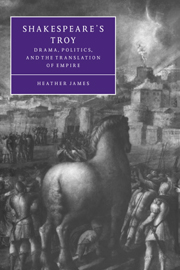Book contents
- Frontmatter
- Contents
- List of illustrations
- Acknowledgements
- Introduction: Shakespeare's fatal Cleopatra
- 1 Shakespeare and the Troy Legend
- 2 Blazoning injustices: mutilating Titus Andronicus, Vergil, and Rome
- 3 “Tricks we play on the dead”: making history in Troilus and Cressida
- 4 To earn a place in the story: resisting the Aeneid in Antony and Cleopatra
- 5 Cymbeline's mingle-mangle: Britain's Roman histories
- 6 “How came that widow in?”: allusion, politics, and the theater in The Tempest
- Notes
- Index
- Cambridge Studies in Renaissance Literature and Culture
6 - “How came that widow in?”: allusion, politics, and the theater in The Tempest
Published online by Cambridge University Press: 29 October 2009
- Frontmatter
- Contents
- List of illustrations
- Acknowledgements
- Introduction: Shakespeare's fatal Cleopatra
- 1 Shakespeare and the Troy Legend
- 2 Blazoning injustices: mutilating Titus Andronicus, Vergil, and Rome
- 3 “Tricks we play on the dead”: making history in Troilus and Cressida
- 4 To earn a place in the story: resisting the Aeneid in Antony and Cleopatra
- 5 Cymbeline's mingle-mangle: Britain's Roman histories
- 6 “How came that widow in?”: allusion, politics, and the theater in The Tempest
- Notes
- Index
- Cambridge Studies in Renaissance Literature and Culture
Summary
Knowing I loved my books, he furnished me
From mine own library with volumes that
I prize above my dukedom.
(1.2.166–8)Shakespeare secured considerable legitimacy for the theater by the time he approached retirement, and one measure of his success is the number of his plays – at least six – included in the court performances to celebrate the wedding of the Princess Elizabeth to the Elector Palatine in 1612. One of The Tempest's compelling questions is whether cultural legitimacy may coexist with autonomy or whether Shakespeare's immersion in the courtly system of patronage means that he, chief playwright of the King's Men, must treat his theater as an instrument of royal authority. The last of Shakespeare's translations of empire, The Tempest reflects on the collusion of theater with the courtly representation that it brashly interrogated in earlier forays. If the play is conceived as a humanistic institutio principi or, more panegyrically, a compliment to King James – and Prospero's paternal authority, love of playing Cupid, disguises, magic, and masque all bear lightly on the figure and pastimes of James I – then the play emerges as a royal address to which other audiences are imagined as second affirmers of royal prerogative. There is no evidence that Shakespeare expressly ingratiates himself to James I in the epilogue, although the final scene has been imagined in just this way, and good reason to suppose that he is well aware of potential tensions among his audiences in the court and the Globe or Blackfriars.
When Prospero looks out at a popular audience and asks for approval, he relinquishes a dream of immediate access to the highest levels of cultural influence.
- Type
- Chapter
- Information
- Shakespeare's TroyDrama, Politics, and the Translation of Empire, pp. 189 - 221Publisher: Cambridge University PressPrint publication year: 1997



